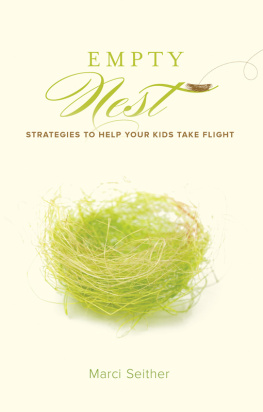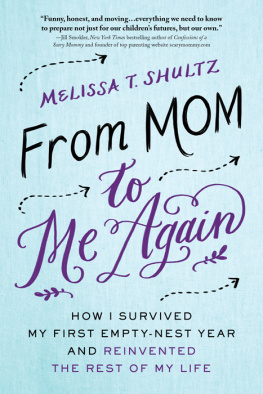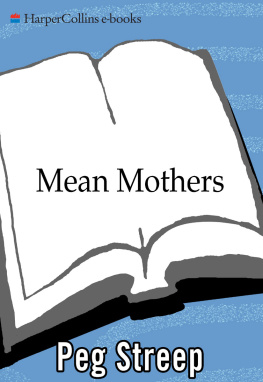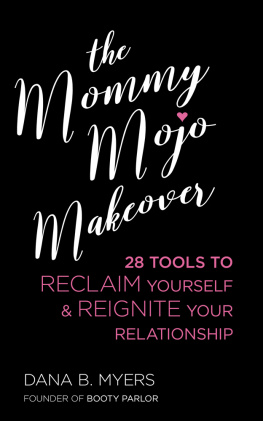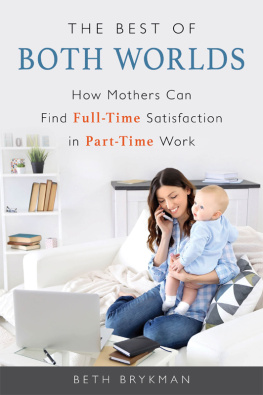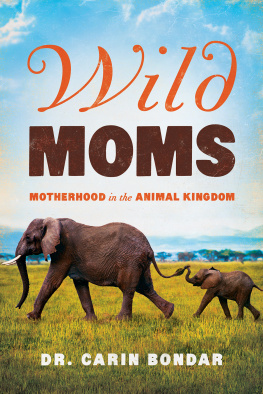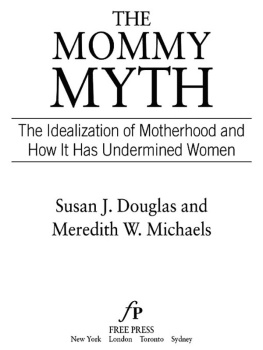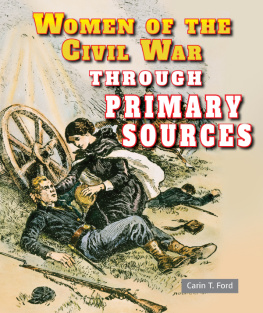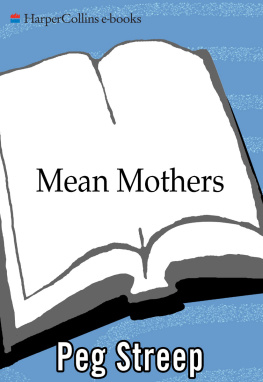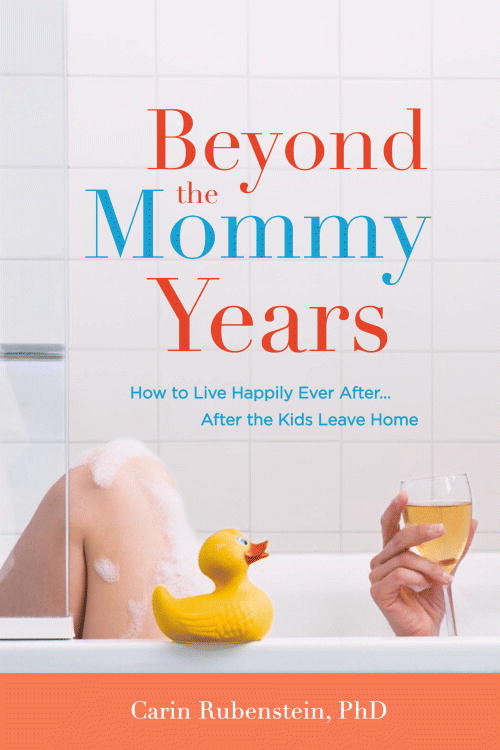Copyright 2007 by Carin Rubenstein, PhD
Illustrations copyright 2007 by Adrienne Hartman
All rights reserved. Except as permitted under the U.S. Copyright Act of 1976, no part of this publication may be reproduced, distributed, or transmitted in any form or by any means, or stored in a database or retrieval system, without the prior written permission of the publisher.
Springboard Press
Hachette Book Group USA
237 Park Avenue, New York, NY 10017
Visit our Web site at www.HachetteBookGroupUSA.com
First eBook Edition: August 2007
ISBN: 978-0-446-53803-9
I wrote this book to convince myself that my life wasnt over after my children left home. Heres what I discovered: most of us will learn not only to live with our childrens absence but to love it.
As I began this book, I was living through the very early stages of adjustment to my newly empty, newly child-free house. Even with my husband around, it felt very empty, very quiet, and very, very clean.
In fact, it felt completely unnatural, like an unhaunted house on Halloween, an undecorated home on the holidays. It was disorienting and upsetting, but also strangely wonderful.
I was living my life feeling a mysterious mixture of both loss and gratification, a stage of life that has no real name. Indeed, empty nest hardly describes the magnitude of the changes I was undergoing and seems inadequate to explain what this stage of life is about. A close friend told me recently that she doesnt like the phrase because it sounds too much like emptiness.
And, pardon me, but the nest is far from empty just because the kids are gone. After all, my husband and I are still here, and were the ones who started the nest, built and feathered it, and paid to fix the water heater and the boiler and everything else in the nest. So to call it empty is grossly inaccurate.
Im still here, so please dont call my nest empty. My wallet is certainly empty, but not my house!
Still, during the first few weeks after my son left home, I felt a sense of loss as I looked at both of my childrens empty bedrooms. I missed them, I missed their physical presence, I missed their being-hereness.
I grieved for their absence, but also for the loss of my role as a full-time mother. A friend says that since her three children moved out, she feels a kind of phantom-limb pain, a persistent ache at their absence. She cant get over the realization that she made career decisions based on the fact that she was a mother and wanted to be available for her children. But, it turns out, her situation wasnt permanent, she says. I thought this was for keeps, but no, this is a rental, she explains, referring to her childrens presence in her life.
That expresses the problem, exactly. At the time it was happening, we felt as if it would last forever, but everyday motherhood does not last. Our time with our children is borrowed, leased, rented out to us, and there comes a point at which we have to realize that its mostly over. And, as a sociologist pointed out to me recently, mothers will know their children for much longer as independent adults than they will have known them as dependent children.
Think about that. Your child is a child for barely eighteen years; but your grown child is an adult for decades. So we have to prepare ourselves to be mothers of adult children for the rest of our lives.
This is the reason that the childrens departure signals a new stage in life for moms, a transition from the intensive-mothering stage to the occasional-mothering stage. Its the official end of the mommy years. But while it signals a conclusion of one stage, its the beginning of another very important one.
Its the beginning of a time of life that is not about the children; its about us.
It is about facing life as more than mother, as after mother, as beyond mother. Its about what we do with ourselves and the next part of our lives, the emancipated stage of motherhood, the third adulthood.
First there was adult life with no children, which began on our eighteenth or twenty-first birthday. Next came parenthood. Finally, once again, there is life with no children at home.
Its dj vu all over again.
Only this time, were not the ones doing the leavingwere the ones being left. But make no mistake, watching our children leave home is one of the most important turning points in our life. It is also the fulcrum on which the remainder of our life rests.
Some of us may look back with longing to the good old days of being in college or of day-to-day motherhood. But others will face the future as women with decades of a new and different kind of life ahead of us. Its a life that includes our growing and grown children, but one that also goes beyond motherhood. This is a life starring us, written by us, and directed by us. If our lives were a movie, it would be called Mom, Emancipated. Or maybe Motherhood, Unplugged.
This new postmommyhood life is a luxury endowed to baby-boom women because weve had fewer children and will live longer than mothers have ever lived before, so we have more good years left after our children leave for college or jobs. There are millions of us, and our numbers are growing each year, as more and more of the youngest children of baby-boom parents leave home. Census figures indicate that about seventy-seven million Americans are baby boomers, born between 1946 and 1964. Of them, at least thirty million no longer have children younger than eighteen.
As members of a huge cohort, the giant generation known as the baby boom, were moving toward this turning point with a lot of company. Right now, around half of married-couple families do not include any children. And every year for the next decade that proportion will continue to rise.
As more mothers join the no-children-at-home brigade, we will also be reinventing ourselves. We are a generation with a unique mind-set, one that values honesty and independence, one that endorses feminism and shared parenting. We would never say that a womans place is only in the hometo be a wife, to stay at home, to defer to her mate. Instead, we embrace the notion that women have choices. Its acceptable for women to marry or not, to have children or not, to be highly educated or not, to work full-time or not. We love the idea of giving ourselves choices as we make our way through life. We question authority, we are irreverent, we are idealists, and we are obsessed with youth, even as we ourselves grow older.
All of us in the baby boom are traversing the same path through this half of adult life. Some of us are already there; others will be there soon enough. But eventually we all will be in the same postmommyhood boat together.
The question is this: will we chart a new course for ourselves and our new lives, or will we paddle around in circles, never getting anywhere we havent already been?
The answer is the subject of this book.
My focus here is mostly on the intense five- or ten-year period when all of these changes take place. Ill offer women examples of how to be thrivers and survivors, rather than stuck and out of luck. Thrivers and survivors embrace lifes many changes, not just biological ones, like menopause, but those that are psychological, like giving up the full-time mother role and replacing it with something equally exciting and rewarding.
Perhaps most important, however, this book is not about how children change as they are launched. And it is not about fathers, either. It is about the mothers who are initiating the launch countdown. It is about the women who emerge on the other side of motherhood, while also propelling themselves into motherhoods second half. The feeling is remarkably similar to breaking from our own parents, only now its the mirror image. It is a time of intense self-reflection, self-examination, and a new setting of priorities. It is a time for undoing regrets, for exploring all possible selves, for finding hidden identities that have been squelched under the enormous pressure of Being Mom.


